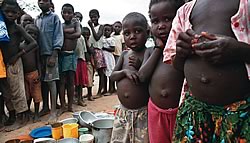Numbers 11:4-6, 10-16, 24-29
To paraphrase a former president in a presidential debate, “There they go again.”
Those Israelites.
Carping and complaining, moaning and groaning.
“If only we had meat to eat!”
“We remember … Egypt.”
“Our strength is dried up …”
“There is nothing … but this manna to look at.”
Here the Israelites are, multiple years into their journey in the wilderness, and they are fed up to their gills with manna – you know, bread from heaven manna? – and what do they want? What do they really want after all these years of eating the bread of heaven?
They want meat.
Oh, they can talk about the veggies and the fruit they used to eat in Egypt – I’m telling you, their doctors were probably really pleased, because they wanted a balanced diet, good for their hearts, but, no, what they really wanted was Capital M-Capital E.-Capital A.-Capital T-MEAT. Because they were tired of eating manna.
It’s not like the Israelites didn’t have enough to eat – they did.
 They had the manna from heaven – the bread that God sent, in just the right amount. Every single morning, God sent them just the right amount of manna. And they didn’t want it anymore. Now I want you to know, in case no one has told you, manna actually is real. Manna is a real substance that you can find, to this day in the Sinai, if you are out in the remote areas, where the Israelites once sojourned. Manna is not what most people think it is. A lot of people think of manna and they think it is those little communion wafers that you get in church on Sunday mornings. Uh-uh-uh, that’s not manna. Manna is … um … plant lice excretion,[1] also known as bug poop.
They had the manna from heaven – the bread that God sent, in just the right amount. Every single morning, God sent them just the right amount of manna. And they didn’t want it anymore. Now I want you to know, in case no one has told you, manna actually is real. Manna is a real substance that you can find, to this day in the Sinai, if you are out in the remote areas, where the Israelites once sojourned. Manna is not what most people think it is. A lot of people think of manna and they think it is those little communion wafers that you get in church on Sunday mornings. Uh-uh-uh, that’s not manna. Manna is … um … plant lice excretion,[1] also known as bug poop.
That’s what the Israelites are complaining about this morning. They are tired of bug poop. It’s not that they are tired of having bug poop every day. What they are tired of is only having bug poop every day.
And frankly, let’s be honest, if had to eat bug poop every day, wouldn’t you be tired of it? After all, there are only so many ways you can fix bug poop. You can boil it. You can bake it. You can toast it. That’s it. There’s nothing else you can do with it. And if you don’t do that pretty quick, it goes rotten anyway.
So, we’re not exactly talking about gourmet meals that the Israelites had had all those years wandering in the wilderness.
It was nutritious.
But it was not gourmet.
The Israelites were not complaining about not having enough. Because they had enough.
And it wasn’t simply that they wanted more – more food, more variety.
They were complaining because they thought that they deserved more. They thought that they had been faithful long enough, wandering around in the wilderness, scooping up bug poop every single morning, and eating it morning, noon and night. They thought that they were special. And because they were special, they should have something more.
The problem is, these people had forgotten, in all those years of roaming the wilderness, of being fed day and night by God on high, of being led day and night by God on high, they forgot that they were special not because they had been so faithful for so long, but because they were created in God’s very image. God chose to create them in God’s very image, the image of love – because, my friends, we are not necessary to God, so God must have wanted us, God must have desired us, God must have loved us into being – and the image of community, the community that comes from when God said, “Let us create humankind in our image.”
The Israelites had forgotten that they were created in that image, the image of love and community, and in God’s version of love and community, it’s never about what you deserve. In God’s version of love and community, it’s not about what you have earned by your faithfulness.
In God’s version of love and community, it is always about what God gives you.
And what God gives you is always enough.
Always.
• • •
I have to tell you, when I read this passage about the Israelites carping and complaining about how hard their lives were because they were tired of eating bug poop every day, I think back and remember my friends, my “families,” in Kenya and in Honduras, in Sudan and in Haiti, and I think to myself, “Man, I know a whole slew of people who would give anything to have what you people had. I know a slew of people who would love to have … enough.”
I mean, come on.
The Israelites are getting a guaranteed meal delivered to their doorstep every single morning, and they are kvetching about this?
They have enough, and they want more?
When I read this passage, I remember the days when I lived in Kenya, and the rains didn’t come and they didn’t come, and our crops dried up and died almost as soon as we put them into the ground, and we had so little to eat … so little … and our children went hungry and their bellies distended, and their hair turned red because they were malnourished, because we were literally eating the leaves off the trees …
I remember walking through the market looking for anything – anything – that I could possibly eat, and over here, there would be this little pile of scraggly little onions (and they were scraggly), and over here there would be this little pile of scraggly little tomatoes – barely an excuse for a tomato – and then I would see these piles of weird greens that I had never seen before and that I had no idea how to cook …
I remember asking the mamas, “What are those greens?” and having them laugh at me, because there I was, the white woman who was the Peace Corps fundi wa maji, the water engineer, who brought them water when possible, and I had no idea what I was looking at …
And I remember them telling me, “Those are leaves from the trees, mama.” And how, when I asked, “Which trees?” the women laughed even more and said, “If we told you that, you wouldn’t have to buy them from us!”
And I remember asking them to teach me to cook those scraggly leaves with those scraggly onions and those scraggly excuses for tomatoes, and how much we all rejoiced when finally, some rain arrived, and we could once again grow some of our crops.
When I think of the way the Israelites moaned and groaned because they didn’t think they could stand one more bite of God’s bread from heaven, I  remember what it was like in Honduras, where we ate rice and beans, beans and rice, rice and beans, beans and rice, rice and beans, beans and rice, morning, noon and night … because we didn’t have anything else …
remember what it was like in Honduras, where we ate rice and beans, beans and rice, rice and beans, beans and rice, rice and beans, beans and rice, morning, noon and night … because we didn’t have anything else …
I remember what it was like in Sudan, a country that has been at war for most of the last sixty years, where food shortages were common, and death stalks the land on a constant basis, and nearly weeping to discover that war had once again brought death to our doorsteps, depriving us of fish and tomatoes and vegetables, because war means death, and death means bodies in the Nile River, and bodies in the Nile River upstream from us meant cholera downstream where we lived … so we couldn’t eat anything that had come into contact with river water … and all we had left were onions and lentils, and lentils and onions, and onions … and onions …
I remember more rice and beans, beans and rice in Haiti, where the poor subsist on less than a dollar a day – if they are lucky – and where oftentimes, there were more beans than rice, because the rice industry has been destroyed in that country by politics and hurricanes and earthquakes … and where to stave off hunger, we would buy pieces of sugar cane, so that we could gnaw on it, so that t
I remember what it is like to be hungry every single day … to not have enough …he sugar would abate our hunger, but it did nothing for our nutrition, and our children there were just as malnourished, with their bellies just as distended, and their hair turning just as red as they did in Kenya.
 So you know what I think, when I read about the Israelites demanding more, demanding M-E-A-T-all-capital-letters-MEAT?
So you know what I think, when I read about the Israelites demanding more, demanding M-E-A-T-all-capital-letters-MEAT?
I think: You have enough! Quit complaining!
• • •
The sad thing is – and we do not like to admit this – we all are like the Israelites at some point in our lives.
We have enough – enough food, enough medicine, enough opportunity – and at first we think, “Thank you, Lord.”
But then …
Then …
We start complaining.
Because after a while, enough is not enough.
After a while, we want more …
After a while, we stop trying to keep up with the Joneses and we start trying to surpass the Joneses, and the next thing you know, we have more than enough, and the Joneses?
Well, the Joneses are out of luck.
This is what our society teaches us right now – you know this. Look at the advertising you see. Advertising that says, “Buy more, more, more, more!” And, “If you buy this, your life will be fulfilled!” Until the next version comes out. Adversiting tells us we simply cannot live if we do not have the latest version of whatever the newest thing is, if we do not wear the newest styles, if we do not drive the newest cars.
And right now, for some strange reason, society is telling us, in every way possible, that it is perfectly okay to say, “I’ve got mine, and I don’t care if you ever get yours!”
But that attitude of us against them? That attitude that demands more, more, more? That attitude that leaves others in the dust?
That is not God’s plan for us, my friends.
That is not how God looks at us. That is not why God created us.
Because in God’s very good creation, there is no such thing as “us’s” and “thems.” All of us – each of us and all of us – are beloved children of God.
God’s plan is that each of us – every single one of us beloved children of God – has, quite simply, enough.
Not too little.
Not too much.
Simply …
Enough.
Because in God’s very good creation, the one in which we who were created in God’s very image live, God’s plan, God’s dream, is that each one of us has enough.
Our call, as faithful people of God, is to make God’s plan, God’s dream for God’s beloved creation, come to fruition.
It is on us to do what God wants done.
Now, the moral of the story for those carping, complaining, moaning, groaning Israelites is that God basically replied, “More?!? You want more?!?! I’ll give you more! I’ll give so much more that you will literally choke on the meat that I will send you, and you will die from it!!!”
Which is what happened. If you keep reading in Numbers, remember, this is what happened.
These carping, complaining, moaning, groaning, there-they-go-again, stiff-necked people, they got what they asked for, and you should always be careful about asking, because you might just get what you asked for.
It’s not a pleasant ending to this story. But it does get across God’s basic message to us, who, I pray, are not carping, complaining, moaning, groaning, there-they-go-again, stiff-necked people.
Hopefully, we actually hear God’s message, and hopefully, we actually live God’s message, which is this:
In God’s eyes, enough truly is enough.
Amen.
Sermon preached on the 18th Sunday after Pentecost, Proper 21, at Immanuel Episcopal Church, Glencoe, Md., on 30 September 2012.
[1] From Barbara Brown Taylor’s Bread of Angels, Cowley Publications, 1997.






